-
 Bitcoin
Bitcoin $82,099.5826
-1.34% -
 Ethereum
Ethereum $1,817.9545
-1.07% -
 Tether USDt
Tether USDt $0.9999
0.02% -
 XRP
XRP $2.0815
-3.96% -
 BNB
BNB $595.8647
-1.53% -
 Solana
Solana $124.0327
-0.92% -
 USDC
USDC $1.0000
0.01% -
 Dogecoin
Dogecoin $0.1634
-3.94% -
 Cardano
Cardano $0.6445
-4.65% -
 TRON
TRON $0.2336
1.34% -
 Toncoin
Toncoin $3.9381
2.61% -
 Chainlink
Chainlink $13.2201
-3.75% -
 UNUS SED LEO
UNUS SED LEO $9.0947
-5.84% -
 Stellar
Stellar $0.2646
-1.90% -
 Avalanche
Avalanche $18.6234
-3.91% -
 Shiba Inu
Shiba Inu $0.0...01214
-3.88% -
 Sui
Sui $2.2126
-6.78% -
 Hedera
Hedera $0.1604
-6.61% -
 Polkadot
Polkadot $4.0237
-1.97% -
 Litecoin
Litecoin $82.1655
-4.48% -
 MANTRA
MANTRA $6.2849
-1.13% -
 Bitcoin Cash
Bitcoin Cash $298.8203
-2.66% -
 Dai
Dai $1.0000
0.02% -
 Bitget Token
Bitget Token $4.4293
-4.57% -
 Ethena USDe
Ethena USDe $1.0000
0.01% -
 Pi
Pi $0.6976
-9.77% -
 Hyperliquid
Hyperliquid $12.5853
-0.74% -
 Monero
Monero $215.4717
-0.22% -
 Uniswap
Uniswap $5.8825
-1.85% -
 Aptos
Aptos $5.1958
-2.29%
How to use the NFT feature of a Binance wallet?
Binance Wallet lets you view, send, and manage NFTs across multiple blockchains, but always verify marketplace legitimacy and understand varying gas fees before transactions to avoid irreversible losses.
Mar 25, 2025 at 02:15 pm
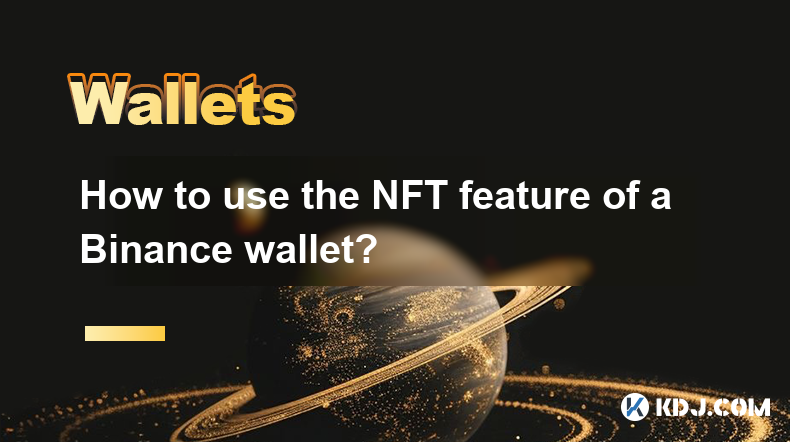
Key Points:
- Binance Wallet's NFT functionality allows users to view, send, receive, and manage their NFTs.
- The process involves connecting your Binance Wallet to supported NFT marketplaces.
- Security is paramount; always verify the legitimacy of websites and contracts before interacting with them.
- Understanding gas fees associated with NFT transactions on various blockchains is crucial.
- Binance Wallet supports multiple blockchains, each with its own nuances regarding NFT handling.
How to Use the NFT Feature of a Binance Wallet?
Binance Wallet offers a comprehensive suite of tools for interacting with Non-Fungible Tokens (NFTs). This functionality extends beyond simple storage; users can actively manage their NFT collections within the wallet interface. This includes viewing detailed information about each NFT, such as its provenance and metadata. The user-friendly interface aims to streamline the NFT management experience for users of all technical skill levels.
Accessing your NFTs within the Binance Wallet is straightforward. After downloading and setting up your Binance Wallet, you'll find a dedicated section or tab clearly labeled "NFTs" or a similar designation. This section will display your existing NFT holdings. If you've not yet transferred NFTs into your wallet, this section will initially appear empty.
To add NFTs to your Binance Wallet, you'll typically need to transfer them from another compatible wallet or marketplace. This process involves copying the NFT's unique identifier (often a token ID or contract address) and pasting it into the appropriate field within the Binance Wallet interface. Remember to double-check the recipient address before initiating any transfer. Incorrect addresses can lead to irreversible loss of your NFTs.
Sending NFTs from your Binance Wallet is similarly straightforward. Navigate to the NFT you wish to send, select the "Send" option, and enter the recipient's wallet address. Confirm the transaction after carefully reviewing all details. Remember that transaction fees (gas fees) will apply, and these fees vary depending on the blockchain network the NFT resides on. Higher network congestion often results in higher gas fees.
Receiving NFTs is a passive process. Once someone sends an NFT to your Binance Wallet address, it will automatically appear in your NFT section after the transaction is confirmed on the relevant blockchain. You will receive a notification within the app, informing you of the incoming NFT transfer. Always be cautious of unsolicited NFT transfers, as they could potentially contain malicious code.
Binance Wallet's NFT functionality supports a variety of blockchain networks, each with its own specific characteristics. The process of managing NFTs might differ slightly depending on the blockchain (e.g., Ethereum, BNB Chain, Polygon). For instance, gas fees and transaction speeds will vary considerably between these networks. Understanding these differences is vital for efficient NFT management.
Connecting your Binance Wallet to external NFT marketplaces extends its functionality. This allows you to browse and potentially purchase NFTs directly through the Binance Wallet interface. However, always exercise caution when connecting your wallet to third-party platforms. Ensure the legitimacy of the website and verify the smart contract's authenticity before proceeding. Phishing attempts are unfortunately common in the NFT space.
Security is paramount when handling NFTs. Never share your private keys or seed phrase with anyone. Be wary of phishing attempts, which often mimic legitimate websites or applications. Enable two-factor authentication (2FA) for an added layer of security on your Binance Wallet account. Regularly review your transaction history to detect any unauthorized activity.
Understanding gas fees is crucial for managing your NFT budget. Gas fees are transaction fees paid to miners or validators to process transactions on the blockchain. These fees can vary significantly depending on network congestion and the specific blockchain being used. Check the estimated gas fees before initiating any transaction to avoid unexpected costs.
Frequently Asked Questions:
Q: What blockchains does Binance Wallet support for NFTs?
A: Binance Wallet supports a range of blockchains, including but not limited to Ethereum, BNB Chain, and Polygon. The specific blockchains supported may change over time, so it's advisable to check the Binance Wallet app for the most up-to-date list.
Q: Can I buy NFTs directly through the Binance Wallet?
A: While Binance Wallet doesn't have an integrated marketplace, it can connect to various NFT marketplaces, enabling you to browse and potentially purchase NFTs through these connected platforms. Always verify the legitimacy of any external platform before connecting your wallet.
Q: What happens if I send my NFT to the wrong address?
A: Sending an NFT to the wrong address is irreversible. The NFT will be lost, and there's typically no way to recover it. Double-check the recipient address before confirming any NFT transfer.
Q: Are there fees associated with sending and receiving NFTs?
A: Yes, there are typically transaction fees (gas fees) associated with sending and receiving NFTs. The amount of these fees depends on factors like network congestion and the blockchain network being used.
Q: How secure is the NFT feature in Binance Wallet?
A: Binance Wallet employs various security measures, but ultimately, the security of your NFTs depends on your practices. Use a strong password, enable 2FA, and be cautious of phishing attempts. Never share your private keys or seed phrase.
Disclaimer:info@kdj.com
The information provided is not trading advice. kdj.com does not assume any responsibility for any investments made based on the information provided in this article. Cryptocurrencies are highly volatile and it is highly recommended that you invest with caution after thorough research!
If you believe that the content used on this website infringes your copyright, please contact us immediately (info@kdj.com) and we will delete it promptly.
- As Sui (SUI) Prepares to Unlock $151M, Coldware (COLD) Quietly Captures the Next Billion Users
- 2025-03-31 21:10:12
- Cryptocurrency investors are increasingly moving capital into stablecoins and tokenized real-world assets (RWAs)
- 2025-03-31 21:10:12
- Rexas Finance (RXS) Attracts Big-Money Investors From Dogecoin (DOGE) and Shiba Inu (SHIB)
- 2025-03-31 21:05:14
- The Resilience of Hyperliquid NFTs
- 2025-03-31 21:05:14
- Hut 8 Launches American Bitcoin, a New Bitcoin Mining Entity Co-founded by Eric Trump
- 2025-03-31 21:05:12
- Avalanche (AVAX) and Near Protocol (NEAR) Stumble as Panshibi (SHIBI) Emerges as the New Meme Coin Giant
- 2025-03-31 21:05:12
Related knowledge

How to easily generate a Bitcoin payment address
Mar 29,2025 at 10:49am
Generating a Bitcoin payment address might seem daunting, but it's actually quite straightforward. This process is crucial for receiving Bitcoin, as each transaction requires a unique address. Understanding how this works is fundamental to using Bitcoin effectively. This guide will walk you through the simple steps, regardless of your technical experti...
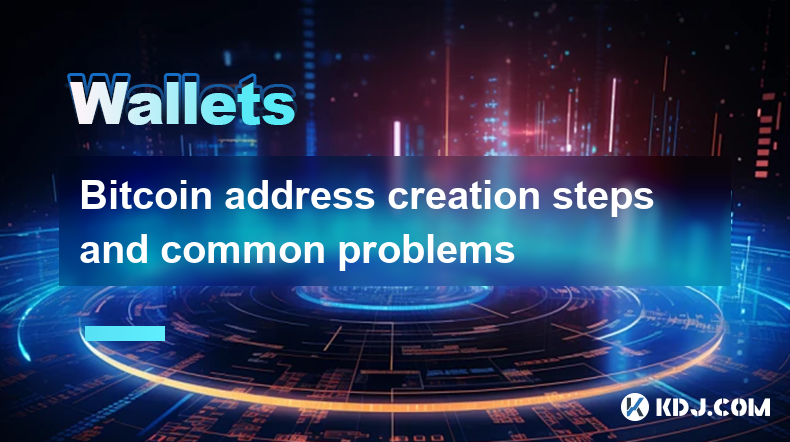
Bitcoin address creation steps and common problems
Mar 30,2025 at 06:07am
Understanding Bitcoin AddressesA Bitcoin address is a unique identifier, similar to a bank account number, used to receive Bitcoin. It's a string of alphanumeric characters generated from a public key, derived from your private key. Understanding the distinction between public and private keys is crucial for Bitcoin security. Your private key should be...
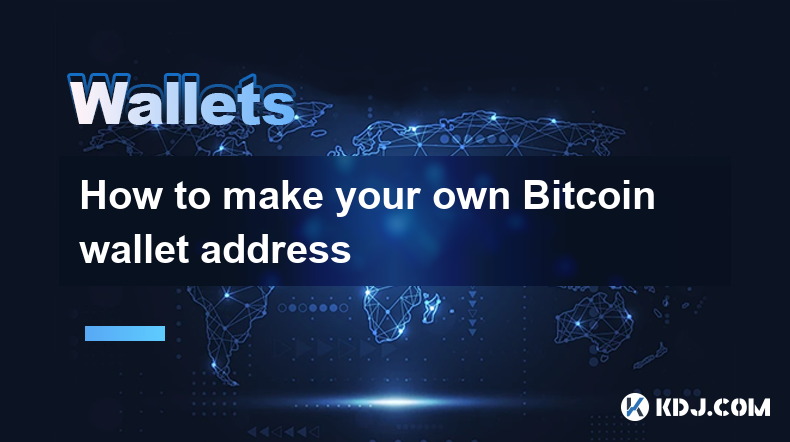
How to make your own Bitcoin wallet address
Mar 29,2025 at 08:42pm
Creating your own Bitcoin wallet address is crucial for securing and managing your Bitcoin holdings. It allows you to independently receive and send Bitcoin without relying on third-party services. This process involves understanding the different types of wallets and choosing the one that best suits your needs and technical expertise. Incorrectly gene...
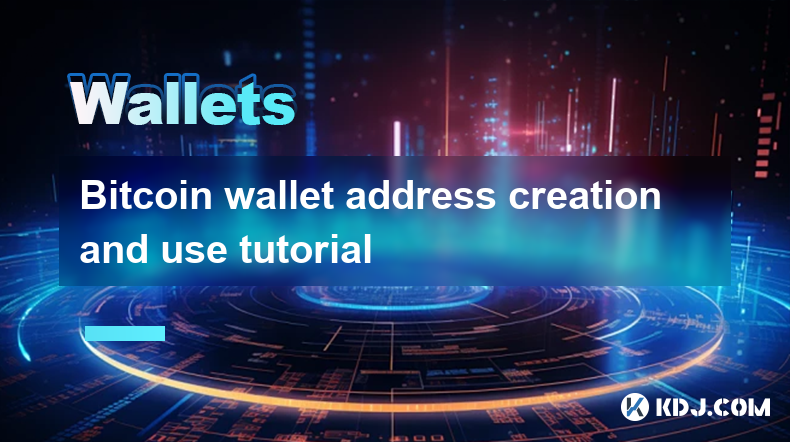
Bitcoin wallet address creation and use tutorial
Mar 29,2025 at 10:14pm
Understanding Bitcoin Wallet AddressesA Bitcoin wallet doesn't store Bitcoin in the way a traditional bank account does. Instead, it stores private keys, which are cryptographic secrets allowing you to access and spend your Bitcoin. Your Bitcoin address, on the other hand, is a public identifier, like an email address, that others can use to send you B...

Bitcoin address generation and secure storage guide
Mar 30,2025 at 08:07am
Understanding Bitcoin AddressesA Bitcoin address is essentially your public key, a string of alphanumeric characters used to receive Bitcoin. It's analogous to your bank account number. Unlike your private key, which is crucial for spending your Bitcoin, your address can be shared publicly without compromising your funds. Generating a new address is sim...
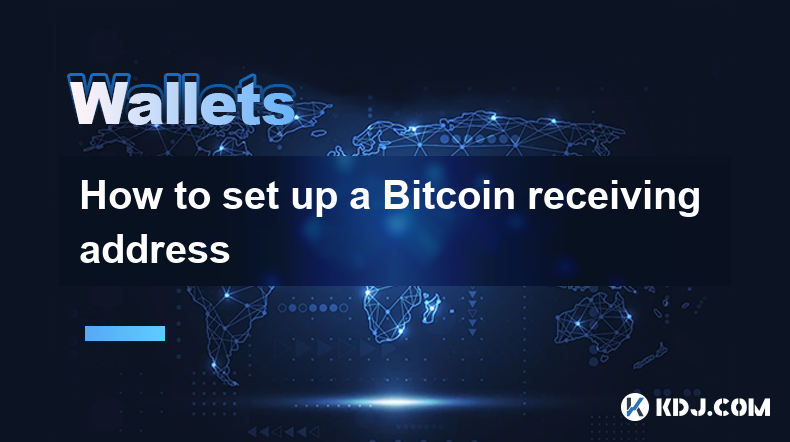
How to set up a Bitcoin receiving address
Mar 30,2025 at 06:14pm
Understanding Bitcoin Receiving AddressesA Bitcoin receiving address is essentially your unique identifier on the Bitcoin network. It's a string of alphanumeric characters that allows others to send Bitcoin to you. Think of it like your bank account number, but specifically for Bitcoin. You need a receiving address to receive Bitcoin. Crucially, you ca...

How to easily generate a Bitcoin payment address
Mar 29,2025 at 10:49am
Generating a Bitcoin payment address might seem daunting, but it's actually quite straightforward. This process is crucial for receiving Bitcoin, as each transaction requires a unique address. Understanding how this works is fundamental to using Bitcoin effectively. This guide will walk you through the simple steps, regardless of your technical experti...

Bitcoin address creation steps and common problems
Mar 30,2025 at 06:07am
Understanding Bitcoin AddressesA Bitcoin address is a unique identifier, similar to a bank account number, used to receive Bitcoin. It's a string of alphanumeric characters generated from a public key, derived from your private key. Understanding the distinction between public and private keys is crucial for Bitcoin security. Your private key should be...

How to make your own Bitcoin wallet address
Mar 29,2025 at 08:42pm
Creating your own Bitcoin wallet address is crucial for securing and managing your Bitcoin holdings. It allows you to independently receive and send Bitcoin without relying on third-party services. This process involves understanding the different types of wallets and choosing the one that best suits your needs and technical expertise. Incorrectly gene...

Bitcoin wallet address creation and use tutorial
Mar 29,2025 at 10:14pm
Understanding Bitcoin Wallet AddressesA Bitcoin wallet doesn't store Bitcoin in the way a traditional bank account does. Instead, it stores private keys, which are cryptographic secrets allowing you to access and spend your Bitcoin. Your Bitcoin address, on the other hand, is a public identifier, like an email address, that others can use to send you B...

Bitcoin address generation and secure storage guide
Mar 30,2025 at 08:07am
Understanding Bitcoin AddressesA Bitcoin address is essentially your public key, a string of alphanumeric characters used to receive Bitcoin. It's analogous to your bank account number. Unlike your private key, which is crucial for spending your Bitcoin, your address can be shared publicly without compromising your funds. Generating a new address is sim...

How to set up a Bitcoin receiving address
Mar 30,2025 at 06:14pm
Understanding Bitcoin Receiving AddressesA Bitcoin receiving address is essentially your unique identifier on the Bitcoin network. It's a string of alphanumeric characters that allows others to send Bitcoin to you. Think of it like your bank account number, but specifically for Bitcoin. You need a receiving address to receive Bitcoin. Crucially, you ca...
See all articles






















































































